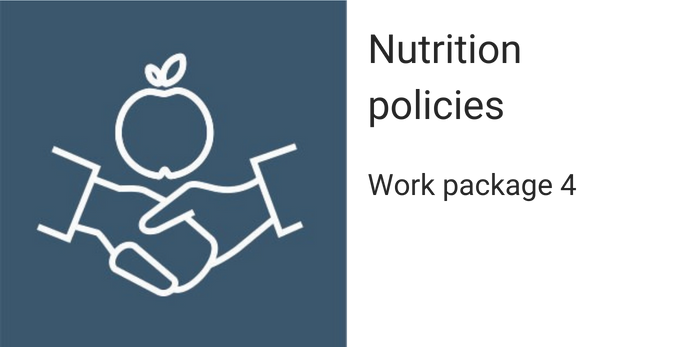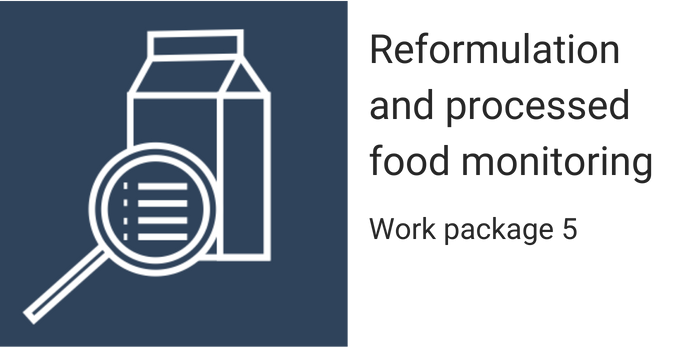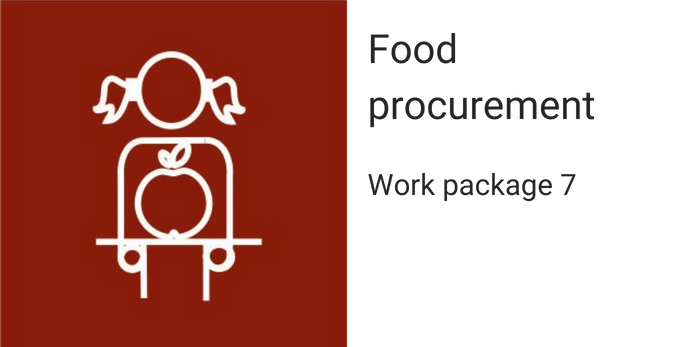Welcome to the 4th Best-ReMaP Newsletter
December | 2022
Welcome to the fourth newsletter of the Best-ReMaP (2020-2023), a Europe-wide Joint Action that seeks to contribute to an improved quality of food supplied to citizens of Europe by facilitating the exchange and testing of good practices.
In this newsletter, you can read a heartfelt message from Mojca Gabrijelčič, coordinator of the JA; an article about the STOP stakeholder conference in Ljubljana; our guidelines for a healthy and mindful festive season; highlights of the core work package activities; and a summary of the interviews with EU experts on the integration and sustainability of Best-ReMaP outcomes.
Best-ReMaP Communications Team

Albert Aszalos

Reka Kovacs

Agnes Makai

Eva Csecsodi
A message from Mojca Gabrijelčič
 Dear Best-ReMaP Partners, Dear Stakeholders and Rightholders, Dear Readers,
Dear Best-ReMaP Partners, Dear Stakeholders and Rightholders, Dear Readers,
The interconnected challenges of health, nutrition, equity, and environmental sustainability have never been as high on the European public health agenda as they are today, making our work in Best ReMaP even more relevant and meaningful. Among clear indicators of the significance of our joint efforts is the high interest in transferring and upgrading existing Best-ReMaP policies on reformulation, restricting marketing and food procurements to the new comprehensive Joint Action on NCD and Cancer – Health determinants, for the period of the next four years.
Navigating through a combination of scientific progress, public awareness, advocacy, consumer demands, consideration of wide range of stakeholders, sustainability and changes in government regulation and culture, promoting public health and good practices in food marketing, food reformulation and public food procurement is an investment in the future healthier food environments for all the European children, their parents and caregivers.
Strong, well linked and effective partnership of 36 public institutions from 24 EU member states and accessing countries, committed and wise work package leadership, well established links with EU and national levels multi-sectoral policy makers, flourishing knowledge transfer with research consortia STOP, CO-CREATE and PEN, and finally not to forget the final common goal in decreasing the burden of obesogenic environment to EU future generations – all that are the building blocks of the third and final year of Best-ReMaP activity plans. We would like to thank for all hard work of the past two years to all our partners and participating institutions – for the years to come, may you always lead by example, never lose awareness of the importance of your role and let this recognition be a very good incentive.
Cordially,
Mojca Gabrijelčič Blenkuš, Coordinator of the Joint Action, National Institute of Public Health of Slovenia, and the NIJZ Best-ReMaP Team

Dear Best-ReMaP Partners, Dear Stakeholders and Rightholders, Dear Readers,
The interconnected challenges of health, nutrition, equity, and environmental sustainability have never been as high on the European public health agenda as they are today, making our work in Best ReMaP even more relevant and meaningful. Among clear indicators of the significance of our joint efforts is the high interest in transferring and upgrading existing Best-ReMaP policies on reformulation, restricting marketing and food procurements to the new comprehensive Joint Action on NCD and Cancer – Health determinants, for the period of the next four years.
Navigating through a combination of scientific progress, public awareness, advocacy, consumer demands, consideration of wide range of stakeholders, sustainability and changes in government regulation and culture, promoting public health and good practices in food marketing, food reformulation and public food procurement is an investment in the future healthier food environments for all the European children, their parents and caregivers.
Strong, well linked and effective partnership of 36 public institutions from 24 EU member states and accessing countries, committed and wise work package leadership, well established links with EU and national levels multi-sectoral policy makers, flourishing knowledge transfer with research consortia STOP, CO-CREATE and PEN, and finally not to forget the final common goal in decreasing the burden of obesogenic environment to EU future generations – all that are the building blocks of the third and final year of Best-ReMaP activity plans. We would like to thank for all hard work of the past two years to all our partners and participating institutions – for the years to come, may you always lead by example, never lose awareness of the importance of your role and let this recognition be a very good incentive.
Cordially,
Mojca Gabrijelčič Blenkuš, Coordinator of the Joint Action, National Institute of Public Health of Slovenia, and the NIJZ Best-ReMaP Team
STOP stakeholder conference in Ljubljana
Key obesity, nutrition and physical activity stakeholders gathered in Slovenia for the final STOP Stakeholder meeting in October 2022
 The key findings of the event were published by Dr Hannah Brinsden (Director of Policy & Programmes – World Obesity Federation):
The key findings of the event were published by Dr Hannah Brinsden (Director of Policy & Programmes – World Obesity Federation):
Over the last 4 years, the STOP project has been undertaking research on the determinants of childhood obesity and the policies and interventions that are necessary to address the rising prevalence of childhood obesity across the region.
Throughout the project, work has been undertaken to better understand the roles and views of different stakeholders, as well as to identify key considerations for ensuring multistakeholder initiatives enhance rather than hinder progress. This work culminated in a 3-day conference, held in Ljubljana, which brought together the STOP consortium and partners, as well as Member State representatives from the WHO Regional and European Commission. The event focused on the potential for research recommendations to inform policies, and was an opportunity to discuss the next steps for childhood obesity research and policy.
The first day of the event focused on the findings of the STOP project, covering research on physical activity in schools, health care interventions for families, government and industry progress to meet global best practice, and the need for stronger regulation on areas such as taxes and marketing. The need to think outside of health and to include civil society, as the voice of citizens and public good, was made particularly clear both in a panel discussion and following session on NGOs involvement in policy. The Director-General of the Directorate of Public Health at the Ministry of Health of Slovenia and WHO Executive Board Chair Dr Kerstin Vesna Petrič was a welcome speaker and guest, providing inspiration and energy to the room about the way forward at a national and regional level.
The second day brought together WHO Euro Member States for the first time since before the COVID pandemic, and representatives were invited to share updates on their activities to help address childhood obesity and improve nutrition and physical activity status across the population. The WHO-STOP Policy Briefs that were launched earlier this year were used as a reference point, and discussions revolved around the value these bring for helping advance and develop national policies.
The final day built on the knowledge and discussions from the previous two days, and was dedicated to discussing solutions to implementation challenges and identifying tangible opportunities for EU Member States to work together, including as part of the new joint action on health determinants. As a closing point, it was recognised that in addition to focusing on health as a silo, there is also a need to further recognise and explore the links between health and environment sustainability, and the inter-related systems that impact both of these.
Reflecting on the event as a whole, it was clear that there was a lot of interest and motivation in the room to take action. With increasing evidence on what needs to be done, and guidance on how to do it, policymakers and civil society alike must now work together to ensure meaningful action at a global, regional and national level.

The key findings of the event were published by Dr Hannah Brinsden (Director of Policy & Programmes – World Obesity Federation):
Over the last 4 years, the STOP project has been undertaking research on the determinants of childhood obesity and the policies and interventions that are necessary to address the rising prevalence of childhood obesity across the region.
Throughout the project, work has been undertaken to better understand the roles and views of different stakeholders, as well as to identify key considerations for ensuring multistakeholder initiatives enhance rather than hinder progress. This work culminated in a 3-day conference, held in Ljubljana, which brought together the STOP consortium and partners, as well as Member State representatives from the WHO Regional and European Commission. The event focused on the potential for research recommendations to inform policies, and was an opportunity to discuss the next steps for childhood obesity research and policy.
The first day of the event focused on the findings of the STOP project, covering research on physical activity in schools, health care interventions for families, government and industry progress to meet global best practice, and the need for stronger regulation on areas such as taxes and marketing. The need to think outside of health and to include civil society, as the voice of citizens and public good, was made particularly clear both in a panel discussion and following session on NGOs involvement in policy. The Director-General of the Directorate of Public Health at the Ministry of Health of Slovenia and WHO Executive Board Chair Dr Kerstin Vesna Petrič was a welcome speaker and guest, providing inspiration and energy to the room about the way forward at a national and regional level.
The second day brought together WHO Euro Member States for the first time since before the COVID pandemic, and representatives were invited to share updates on their activities to help address childhood obesity and improve nutrition and physical activity status across the population. The WHO-STOP Policy Briefs that were launched earlier this year were used as a reference point, and discussions revolved around the value these bring for helping advance and develop national policies.
The final day built on the knowledge and discussions from the previous two days, and was dedicated to discussing solutions to implementation challenges and identifying tangible opportunities for EU Member States to work together, including as part of the new joint action on health determinants. As a closing point, it was recognised that in addition to focusing on health as a silo, there is also a need to further recognise and explore the links between health and environment sustainability, and the inter-related systems that impact both of these.
Reflecting on the event as a whole, it was clear that there was a lot of interest and motivation in the room to take action. With increasing evidence on what needs to be done, and guidance on how to do it, policymakers and civil society alike must now work together to ensure meaningful action at a global, regional and national level.
Guide to a healthy festive season
With the festive season approaching, most of us are probably busy shopping for presents, arranging visits to family and friends, and planning – or dreaming about – Christmas and New Year’s Eve menus. It’s true that the last few weeks of the year are all about celebrating, but it’s equally important to take care of your health and the health of our environment in this period, as well. Here are some simple ideas to help you do just that.

Diet: a delicious menu does not have to be expensive or complicated
When planning the Christmas menu keep in mind the foundations of a healthy, balanced diet that is built on good quality, locally available and seasonal ingredients. According to the Hungarian Dietetic Association’s nutritional guide called OKOSTÁNYÉR® we should aim to:
Eat at least 4 portions of fruit or vegetables a day. Of these, at least 1 portion should be fresh or raw. Serve red, orange and dark green vegetables such as tomatoes, carrots and broccoli with every main meal. Eat dry legumes (e.g. beans, lentils, chickpeas, soya) in soups, stews, salads, creams. Top breakfast cereals or even pancakes with fruit, depending on the time of year. Eat small handfuls of unsalted oil seeds such as nuts, almonds, hazelnuts, pumpkin seeds, sunflower seeds 2-3 times a week.
Eat 3 portions of cereals per day, of which at least 1 portion should be whole grain. Replace refined cereals with whole grain cereals, e.g. wholemeal bread, bread rolls, buns, pasta, biscuits, cereal flakes, brown rice.
Consume milk and dairy products every day. Choose reduced fat! They contain almost the same amount of many important nutrients, including calcium, as whole milk and dairy products, but have less fat and energy. Eat a variety of whole protein-rich foods each week, such as lean meats, fish or eggs.
Drink at least 8 glasses of fluid a day. 5 of these should be drinking water. Drinking water is the best way to quench thirst. Fruit and vegetable juices, sugar-containing teas, soft drinks, smoothies, milky drinks (e.g. cocoa, milk coffee) should be consumed occasionally in small quantities to supplement fluid intake.
Reduce salt, fat and sugar intake. When shopping, compare the salt, fat and sugar content of products and choose the lower one. When flavoring foods and drinks, use as little sugar and salt as possible. Substitute some of the salt with fresh or dried herbs.
Last but not least, as tempting as it is, we should try to avoid alcohol consumption altogether or at least drink in moderation. Alcohol consumption has been associated with more than 200 types of illness and accidental injury. It is often argued that moderate alcohol consumption can reduce the risk of cardiovascular disease, but it is important to know that the risks of alcohol consumption always outweigh the potential benefits. Current recommendations emphasize the importance of avoiding alcohol consumption altogether or drinking in moderation. A maximum of 1 unit per day for women and 2 units per day for men is consistent with the principle of moderation, and no more than 3-4 units of alcohol should be consumed at any one time. 1 unit of alcohol is for example 1 dl of wine, 2 dl of beer or 2 cl of spirits.
Sustainability and shopping: give the planet a break, plan a sustainable holiday
Be a responsible cook by buying less and using what you already have in your cupboard. Choose local ingredients because it means less packaging and less pollution. A balanced diet can also be achieved while reducing our ecological footprint and benefiting the environment. If you want to follow a sustainable diet, consider WHO’s guidelines: keep a diet that is mainly plant-based (vegetables, fruits, whole grains and legumes); buy locally sourced ingredients, follow seasonality and prepare your meal at home.
An ecologically sustainable, balanced diet should include a moderate amount of fish, milk, dairy products and vegetable oils from sustainable sources. The consumption of meat, especially processed meats, should be kept to a minimum, as meat consumption significantly increases our ecological footprint and the consumption of large quantities of red meat and processed meat is also harmful to our health.
Reduce food waste: There is an important difference between the meaning of ‘best before’ and a ‘use by’ dates that are marked on food products. The ‘best before’ date is displayed on foods that have a longer shelf life, low moisture content or have undergone some kind of preservation process (e.g. freezing, canning), such as canned goods, cereal products, rice, spices, frozen products. These foods are still safe to eat after the ‘best before’ date if the storage instructions have been followed and the packaging is undamaged. The ‘best before’ date only means that the food may lose flavour, aroma or consistency after this date.
On the other hand, ‘use by’ labels are used for foods that spoil quickly (e.g. ready meals, ice cream, meat, meat products, dairy products). After the expiry date, the product must not be marketed and should not be consumed as it is considered unsafe.
Consider slowing down and spend more time in the kitchen during the holidays. Adopt the DIY concept in preparing your meal and desserts. Home-baked sweets will contain less sugar and fat than the commercial products. When baking at home, you have the liberty to adjust the recipe – e.g. you can use less sugar or replace some of it with natural or artificial sweeteners. For example, a typical commercial sponge cake contains 30-35 grams of sugar per 100 grams, while if you make it at home, a home-made version with only half of this amount of sugar would be equally delicious. Moreover, using old family recipes evoke fond memories and provide a relaxed opportunity for the family to spend joyful time together.
Exercise: go outdoors, the fresh air will recharge your body and soul
According to the analysis of the Regional Office for Europe of the World Health Organization, scientific evidence shows major beneficial effects of physical activity on health. ‘Physical activity reduces the risk of most chronic diseases, including cardiovascular disease, overweight and obesity, type 2 diabetes and several cancers.
Furthermore, physical activity improves musculoskeletal health and psychological well-being.’ During the festive season, it is perhaps even more tempting than usual to stay indoors in the warmth of your room, but especially at this time of year it’s important to remind ourselves that a light walk in the fresh air can have a significant positive impact on our health, our bodies and of course our minds.
Highlights of Best-ReMaP in the second half of 2022:
Review of the key activities of the core work packages

The JA Best-ReMaP roadmap was drafted, aimed at aligning the framework of the core Work Packages on food reformulation, regulation of food marketing and public procurement and identifying a long-standing process with the European Commission and the Member States to transfer the evidence into the national public health policies on nutrition. Simultaneously, a food database, in collaboration with the JRC, has been developed, to synthesize the policies, mainly monitoring the food reformulation, reducing the food marketing to children and public food procurement.

The reformulation and monitoring activities have been focusing on the knowledge building, knowledge sharing and knowledge transfer in EU Member States. We are continuing with the implementation of a European Standardised Monitoring system for the reformulation of processed food. A second snapshot has been launched in 6 countries with preexisting data and in 8 countries for which data from the Euremo project can be gathered. The work to assess the impact of reformulations on nutrient intake has been initiated.

We have performed the testing of the EU-WHO Nutrient Profile Model. This testing aims to test the performance of the revised version of the 2015 WHO Europe nutrient profile model (NPM) using data from national food branded databases and to compare the results obtained with the 2015 WHO-EURO model. We have also focused on developing technical guidance for implementing food marketing codes of practice and on reviewing existing food marketing monitoring protocols to develop an EU-coordinated monitoring framework. The review of monitoring protocols, which will serve as a guidance document for the subsequent process of pilot testing monitoring tools in Member States to develop a comprehensive EU-coordinated protocol. A first draft was shared with partners to provide their feedback, the results are currently being collected and evaluated.

Member States were given access to the Food Catalogue and are currently testing it on home ground. The majority of them have successfully completed the milk and milk products market overview and created food types based on the overview and with the help of the templates from the Slovenian examples. In addition, member states have reported to Denmark regarding the identification of the national/regional/local focal points for public food procurement. The activities were also aimed at developing the protocol for the OECD study with the selection of criteria and institutions that will participate in the study.
Deliverable summary of the interviews with EU experts
on the integration and sustainability of Best-ReMaP outcomes
WORK PACKAGE 4: NUTRITION POLICIES
 Regulation of food and their advertisements are a necessary stepping stone to achieve a healthier-fed European society. However the results will prove ephemeral if not paired with a careful examination of the context any given Member State provides after the implementation.
Regulation of food and their advertisements are a necessary stepping stone to achieve a healthier-fed European society. However the results will prove ephemeral if not paired with a careful examination of the context any given Member State provides after the implementation.
To remedy this end, WP4 conducted interviews with European experts on what makes a food initiative sustainable and lasting.
Experts agreed on that the very first problem one encounters when addressing this issue is the disagreement between nations and policy-makers what even healthy means exactly, since, according to Herbert Dorfmann MEP from the EPP, ’sugar and fat are not unhealthy per se, but they become so if consumed in excessive quantity.’
Another obstacle in the sustainability of food-initiatives is the different level Member States start from, i.e. accessibility to healthy food, with Malta’s 0.5% share of organic food production compared to Austria being above 25%.
Although the experts agreed on the importance of informed consumers, their views differed on how to achieve this: some criticized Nutriscore as not being representative enough, others disagreed on whether food advertisements should be regulated as a whole or only those targeting children.
To get more information about European experts’ views on how to ensure the long-term sustainability of nutrition policies, you can find the report here.

Regulation of food and their advertisements are a necessary stepping stone to achieve a healthier-fed European society. However the results will prove ephemeral if not paired with a careful examination of the context any given Member State provides after the implementation.
To remedy this end, WP4 conducted interviews with European experts on what makes a food initiative sustainable and lasting.
Experts agreed on that the very first problem one encounters when addressing this issue is the disagreement between nations and policy-makers what even healthy means exactly, since, according to Herbert Dorfmann MEP from the EPP, ’sugar and fat are not unhealthy per se, but they become so if consumed in excessive quantity.’
Another obstacle in the sustainability of food-initiatives is the different level Member States start from, i.e. accessibility to healthy food, with Malta’s 0.5% share of organic food production compared to Austria being above 25%.
Although the experts agreed on the importance of informed consumers, their views differed on how to achieve this: some criticized Nutriscore as not being representative enough, others disagreed on whether food advertisements should be regulated as a whole or only those targeting children.
To get more information about European experts’ views on how to ensure the long-term sustainability of nutrition policies, you can find the report here.
We’re on social media
To stay up to date with the latest developments of the Best-ReMaP project and to get interesting information about what’s happening on the nutrition front in the EU, sign up for our newsletters and follow our social media channels.

The content of this website represents the views of the author only and is his/her sole responsibility; it cannot be considered to reflect the views of the European Commission and/or the European Health and Digital Executive Agency (HaDEA) or any other body of the European Union. The European Commission and the Agency do not accept any responsibility for use that may be made of the information it contains.
